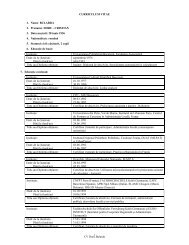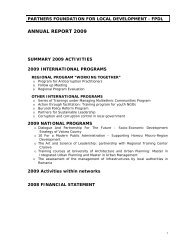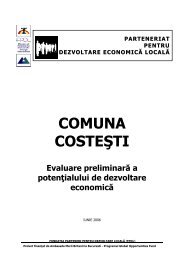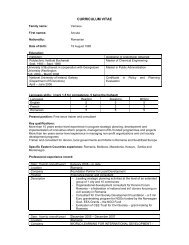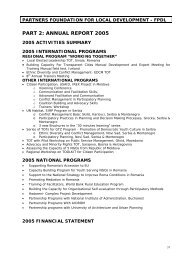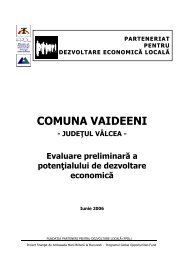Organizational Development: A Manual for Managers and ... - FPDL
Organizational Development: A Manual for Managers and ... - FPDL
Organizational Development: A Manual for Managers and ... - FPDL
Create successful ePaper yourself
Turn your PDF publications into a flip-book with our unique Google optimized e-Paper software.
enjoy some social activity without taking much care about their official position <strong>and</strong> common<br />
restrictions. They enjoy it <strong>and</strong> they are much better next morning, which is most important.<br />
‘Free time’ in facilitating environment is also very important <strong>for</strong> participants to learn from each<br />
other different things, to plan future co-operation, to establish actual networks. This additional<br />
effect may become the most important outcome of the training event, if there is a right mix of<br />
participants, properly motivated.<br />
11. Training delivery<br />
11.1.CONTROL. In some training events a priority will be given to the getting acquired certain<br />
knowledge or technical skill in a minimum time. It would require quite strong control over the<br />
content of the process from the trainer side. If participants shall discuss the quality of services<br />
– they should discuss just quality of services <strong>and</strong> nothing else. In other events, the priority may<br />
be just to allow participants to be acquainted <strong>and</strong> improve direct communications, or build a<br />
team. In such cases, it may be enough to ensure control over the situation in general – if the<br />
process of certain kind is going, does not matter what they do.<br />
For example, if we need them being involved in discussion <strong>and</strong> provide opportunity to make a<br />
film which would demonstrate their roles in a group <strong>and</strong> body language – does not matter,<br />
what do they discussing, if it is a subject proposed by trainer or something else. A training<br />
program is not an end in itself. When the objectives require changing the pre-designed<br />
program, it should be done. If the objectives require keeping within the planned agenda, it<br />
should be ensured. Both over-control <strong>and</strong> the lack of control may be harmful <strong>and</strong> destroy<br />
training event. What should not be allowed to trainer that is to loose the control over the<br />
necessary extent of control.<br />
11.1 REALITIES. Objectives of the course may require that training delivery would be based on<br />
processing real facts of local-governments life. For example, it is necessary, when developing<br />
Problem Solving skills. Nobody would express a lot of enthusiasm in solving artificially<br />
designed problem (on the other h<strong>and</strong> – such solutions are always senseless). When required<br />
to teach people how to act in real environment, trainer should be well in<strong>for</strong>med about real<br />
circumstances of trainees’ work, <strong>and</strong> have sufficient qualification to be able to assist them in<br />
solving their existing problems. The more close to the reality the training process is – the more<br />
chances to affect the reality through the changing practice after the training event. However,<br />
sometimes it may be dangerous to deep in real circumstances. For example, it is always<br />
tempting to deal with real conflict when teaching Conflict Resolution. However, trainer should<br />
be sure that he would be able to manage the situation. Sometimes trainer should be very<br />
careful <strong>and</strong> not to touch some painful <strong>for</strong> participants issues. For that, he should also be well<br />
in<strong>for</strong>med.<br />
216



